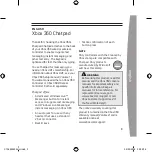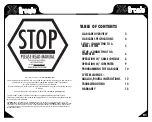
Rev A
Page 2
Tel: 714-529-9495
Fax: 714-529-1366
561 Tamarack Ave, Brea CA USA
pacsealhydraulics.com
Maintenance Instructions
KR-150 Regulator
2. With a 5/16” Allen wrench, loosen and remove
the socket head cap screws. Remove the
adjustment head 27 and spring assembly by
lifting and tilting and holding the spring plate 16
to clear the piston guide 30. Remove springs,
guide 25 and spring plate 16 and clean barrel
and all parts.
3. Remove the flange screws 34 from the inlet
flanges 31. Carefully remove these flanges
and attached inlet flow plates 23.
4. Remove the flange screws 34 from the vent
flanges 31. Carefully remove these flanges
and attached vent flow plates 24.
5. Remove the flow plates from each by
unscrewing the screws 33. Do not place the
flow plates lapped side down on any hard
surface.
6. From both sides of the body, remove the seal
rings (11,13), valve cage 14 and springs
(12,15) from the seal container. Carefully set
these aside.
7. Remove the outlet flange 32 by removing the
screws 34.
8. Remove the lower flange 22 by removing the
screws 34.
9. Using a soft tool, lightly tap the seal container
from the bottom to loosen the piston guide from
the body. Lift this assembly through the top of
the body.
10. Remove the piston 29 from the seal container
28 by removing the screw 36. Take care not to
scratch the bores of the seal container.
11. Remove all o-rings and back-up rings. Clean all
parts with a degreaser, wiping with clean rags.
12. Inspect all lapped surfaces for scratches, dings
or dull spots that would prevent them from re-
use. Inspect the bores of the seal container for
linear scratches that would propagate leaks.
Reassembly
1. Before replacing the seals and rebuilding the
regulator, apply a light coating of lubricant.
2. Replace all o-rings and back-up rings on seal
rings, flow plates, piston, piston guide and
flanges, lubricating generously.
3. Install the piston on the seal container, using
the screw, applying medium strength
threadlocker.
4. Carefully install the valve cage, wave spring
and vent seal ring from one side of the seal
container, then repeat with the supply seal ring
and spring. Use a soft, blunt tool to help
compress the back-up ring to engage in the
hole. From the opposite side, install the
springs. Then install the opposite seal rings.
5. Snug the piston guide over the piston.
6. Slide the seal container assembly down into
the top of the regulator body, making sure the
seal container faces are parallel with the
opposing ports and the notch faces the outlet.
7. Install the o-rings seated in the face grooves
before attaching the flanges to the flow plates,
using the screws and medium strength (blue)
threadlocker. Use rags to protect the flow
plate lapped surface and edges.
8. Important! To protect the seal rings in the seal
container during reassembly, ease the inlet
flow plates into the body using a 3/16” thick
spacer between the flange and the body to
prevent over-travel. Orient the flange so that
the retaining screws are parallel with the
bottom of the body. Remove the spacer.
9. Insert the screws and tighten screws in a cross
bolt pattern around the adapter flanges. The
inlet flow plate should be in light contact with
the seal rings.























